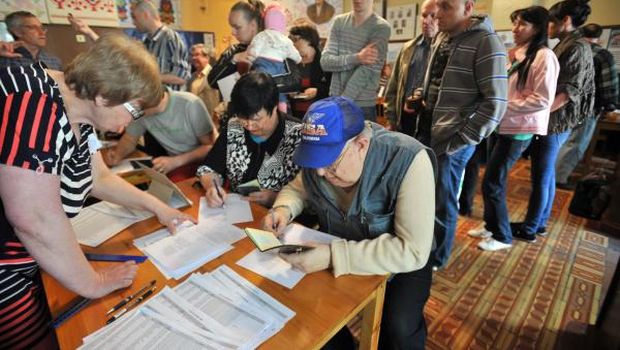
People vote in a polling station during a so-called referendum in the eastern Ukrainian city of Donetsk on May 11, 2014. (AFP Photo/Genya Savilov)
Mariupol and Slaviansk, Reuters—East Ukrainian rebels pressed ahead with a referendum on self-rule on Sunday and new fighting flared in a conflict that has raised fears of civil war and pitched relations between Russia and the West into their worst crisis since the Cold War.
Clashes broke out overnight around a television tower on the outskirts of Slaviansk, the most heavily defended rebel redoubt. They resumed in the morning just before voters made their way to polling stations through streets blocked by barricades of felled trees, tires and rusty machinery.
“I wanted to come as early as I could. We all want to live in our own country,” said Zhenya Denyesh, a 20-year-old student voting at a three-storey concrete and glass university building.
Asked what he thought would come after the vote, he replied: “It will still be war.”
Western leaders threatened more sanctions against Russia in the key areas of energy, financial services and engineering if it continues what they regard as efforts to destabilize Ukraine.
Moscow denies any role in the rebellion or any ambitions to absorb the mainly Russian-speaking east into the Russian Federation following its annexation of the Black Sea peninsula of Crimea after a referendum in March.
For a vote on which so much hangs, the referendum in the regions of Luhansk and Donetsk, which has declared itself a “People’s Republic,” seemed a decidedly ad hoc affair. Ballot papers have been printed without security provision, polling stations were limited in some areas and there was confusion on quite what people were asked to endorse.
Long lines quickly built up in the port city of Mariupol, scene of fierce fighting over the last few days, where there were only four polling centers for a population of about half a million. The main hall of one council building was packed with people waiting to enter the two polling booths available.
Thirty-three-year-old engineer Sergei said he would vote “Yes” to the question on the ballot paper, printed in Russian and Ukrainian: “Do you support the act of state self-rule of the Donetsk People’s Republic?”
“We’re all for the independence of the Donetsk republic,” he said. “It means leaving behind that fascist, pro-American government [in Kiev], which brought no one any good.”
But in the same queue of voters, 54-year-old Irina, saw a ‘Yes’ vote as endorsement of autonomy within Ukraine.
“I want Donetsk to have its own powers, some kind of autonomy, separate from Kiev. I’m not against a united Ukraine, but not under those people we did not choose, who seized power and are going to ruin the country.”
At another Mariupol voting center, officials moved some ballot boxes outside onto the street, placed against a wall.
The eastern rebellion began shortly after President Viktor Yanukovych fled to Russia in February under pressure from mass protests in Kiev by pro-Western activists. They took to the streets after he decided to discard a cooperation accord with the European Union in favor of closer ties with Moscow.
Some see a “Yes” vote as endorsement of autonomy within Ukraine, some as a move to independence and others as a nod to absorption by Russia.
Annexation is favored by the more prominent rebels, but the ambiguity may reflect their fears an explicit call for full “independence” might not have garnered the support they seek and could leave them in an exposed position towards Kiev.
Ukrainian leader Oleksandr Turchynov has urged east Ukrainian political leaders to join a “Round Table” discussion on devolution of powers in Ukraine. But he has said he would not negotiate with “terrorists,” a formulation meant to exclude most of the more prominent rebel leaders.
The Ukrainian Defense Ministry said rebels attacked their forces guarding a television tower on the outskirts of Slaviansk. One Ukrainian serviceman was wounded in fighting.
Sergei, a fighter speaking near an outer checkpoint, blamed Ukrainian forces for the clash.
“They are probably trying to put people off voting, but it won’t work,” he said.
Eastern rebels and the Kremlin regard the pro-European Kiev government that replaced Yanukovych as lacking legitimacy.
Kiev aims to banish such questions by holding national presidential election on May 25, but the West sees Russian efforts to disrupt them and threatened economic sanctions against Moscow over the weekend.
Sunday’s vote went ahead in the important industrial region despite a call by Russian President Vladimir Putin on Wednesday to postpone it, a move that briefly raised hopes for an easing of tension. Western leaders have accused Putin of destabilizing Ukraine, and Washington criticized as “provocative” a trip he made to Crimea on Friday.
German Chancellor Angela Merkel and French President Francois Hollande said on Saturday they would back further sanctions against Russia if Ukraine’s presidential election failed to go ahead because of disruption in the east.
Turchynov, who has ruled the referendum illegal and dismissed the allegations that the Kiev authorities are neo-fascists, told eastern regions on Saturday any move to secession would be “a step into the abyss.”
